Global Development, Peace and Feminist Foreign Policy
The FIERCE Campaign represents a collective commitment to championing global development, peace, and feminist foreign policy. The mission includes enforcing global ceasefires, sanctioning human rights violations, and prioritizing action plans for women, peace, and security.
In conflict zones, women face unique challenges, yet they must not be seen as a homogenous group, they face a variety of needs, vulnerabilities, and circumstances.
Nearly 3.5 million people entered the EU in 2022 as refugees with asylum status, according to official reports. Additionally, since Russia's full-scale invasion of Ukraine in February 2022, about 4.2 million Ukrainians have been granted temporary asylum in EU member states. According to the European Union Agency for Asylum, Syrians and Afghans maintained their annual record as the largest categories of asylum-seekers in the bloc, with around 100,000 applications filed in 2023. According to data from the International Organization for Migration (IOM), at total of 213,896 migrants arrived in Europe in 2022. There have also been reports of African migrants seeking safety in Europe, including those from Algeria and Libya.
The call for immediate ceasefires worldwide is critical to prevent conflicts from further escalating into genocide, ethnic cleansing, or crimes against humanity. Early identification and protection of potential targets in conflicts are essential. Respecting the decisions of the International Court of Justice (ICJ) and avoiding complicity in these crimes forms a cornerstone of our approach. Implementing a robust action plan for the women, peace, and security agenda (UN1325) remains a priority.
Labor shortages are filled in part by migrants: 9.93 million non-EU workers, or 5.1% of the total, were employed within the EU in 2022. According to Paola Alvarez, the IOM's Regional Specialist on Labour Mobility and Social Inclusion, the reason why Europeans have a higher employment rate (77%) than that of non-Europeans (62%) is due to "structural barriers and discrimination, but also the existence of a black market that is taboo". This unofficial market encompasses more than just agricultural labor; it also includes manufacturing, textiles, delivery services, dining establishments, and lodging.
We also aim to stop the privatization of public goods and services, which increases the unpaid care burden that is predominantly on women. Recognizing the disproportionate impact of climate change on women and integrating gender equality into climate policies is vital. Empowering women in climate governance will build resilient communities and foster sustainable development.
We advocate for a Europe without borders, where all migrants, particularly refugees and undocumented individuals, enjoy equal rights.
Non-EU workers were overrepresented in a few industries in 2022: construction (which employs 9.1% of non-EU workers compared to 6.6% of all workers in the EU), administrative and support services (such as call centers), logistics and distribution (7.6% compared to 3.9%), hotels and restaurants (11.3% compared to 4.2%), and domestic work (5.9% compared to 0.7%).
Ending racist narratives and institutional violence towards migrants is imperative. Regularizing the status of migrant workers in irregular employment and ensuring unrestricted access to public services regardless of asylum status are essential steps.
Across Europe, countries are grappling with an acute shortage of skilled workers, driven by aging populations, declining birth rates, and rapid technological advancements, which threaten economic stability and growth.
Germany faces a significant skilled worker shortage, with experts estimating the need for 1.5 million immigrants annually to maintain its labor force. The demographic shift towards an older population exacerbates the shrinking workforce, and the demands of the Fourth Industrial Revolution create a substantial skills gap. Immigrants are crucial in filling roles in sectors facing severe shortages, such as healthcare, engineering, IT, and skilled trades. To attract and integrate this workforce, Germany must streamline visa processes, recognize foreign qualifications, provide language and cultural training, and ensure equal labor market opportunities. Additionally, education systems must support lifelong learning and industry partnerships for skill development. Public perception and social integration are also vital, necessitating community programs and public awareness campaigns to promote the benefits of immigration. Welcoming 1.5 million immigrants annually is essential for sustaining Germany's economic growth, competitive edge, and social systems in the face of demographic and technological challenges.
Our campaign includes specific commitments to support refugee women, ensuring their rights and economic independence. This includes revising EU refugee deals with authoritarian governments to align with EU values and human rights standards, and promoting economic independence for refugee women, particularly those who are victims of sexual and gender-based violence (SGBV).
The FIERCE Campaign is dedicated to creating a world where equality, justice, and peace are not just ideals but realities. Through our comprehensive and inclusive policy objectives, we aim to build a sustainable and equitable future for all.

